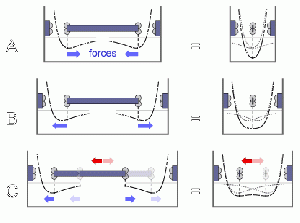Difference between revisions of "File:0322pairSnap.gif"
(added original text) |
(added a local backup to the link) |
||
| (2 intermediate revisions by the same user not shown) | |||
| Line 4: | Line 4: | ||
"unsmoothly sliding atoms" | "unsmoothly sliding atoms" | ||
| − | = Associated text from Eric's Website | + | = Associated text from Eric's Website = |
| − | == | + | == Softly supported sliding atoms can undergo abrupt transitions in energy == |
When the forces between sliding atoms do not greatly affect their positions relative to their supporting structures, grazing-incidence paths result in smoothly varying potential energies. When atoms are coupled to moving parts by softer elastic constraints, however, the behavior can be qualitatively different. | When the forces between sliding atoms do not greatly affect their positions relative to their supporting structures, grazing-incidence paths result in smoothly varying potential energies. When atoms are coupled to moving parts by softer elastic constraints, however, the behavior can be qualitatively different. | ||
| Line 13: | Line 13: | ||
A snapping interaction can result from bending of the bond anchoring a monovalent atom in a surface layer. Such interactions can be avoided by using surfaces in which multiple bonds anchor surface atoms more rigidly, or in which repulsive interatomic interactions are reduced (or [https://web.archive.org/web/20160314130257/http://e-drexler.com/p/04/03/0322nonrepulsive.html avoided entirely]). Snapping interactions must be avoided in constructing bearings, but can be exploited to construct dissipative sliding interfaces (dampers) and mechanisms with many closely-spaced potential wells that serve as multi-position detents. | A snapping interaction can result from bending of the bond anchoring a monovalent atom in a surface layer. Such interactions can be avoided by using surfaces in which multiple bonds anchor surface atoms more rigidly, or in which repulsive interatomic interactions are reduced (or [https://web.archive.org/web/20160314130257/http://e-drexler.com/p/04/03/0322nonrepulsive.html avoided entirely]). Snapping interactions must be avoided in constructing bearings, but can be exploited to construct dissipative sliding interfaces (dampers) and mechanisms with many closely-spaced potential wells that serve as multi-position detents. | ||
| + | |||
| + | [[File:0415tenseBear.gif|thumb|"... repulsive interatomic interactions are reduced (or [https://web.archive.org/web/20160314130257/http://e-drexler.com/p/04/03/0322nonrepulsive.html avoided entirely])..."]] | ||
Latest revision as of 07:24, 20 September 2021
Source: https://web.archive.org/web/20160314100841/http://e-drexler.com/p/04/02/0315pairSnap.html
Author: Eric K. Drexler
"unsmoothly sliding atoms"
Associated text from Eric's Website
Softly supported sliding atoms can undergo abrupt transitions in energy
When the forces between sliding atoms do not greatly affect their positions relative to their supporting structures, grazing-incidence paths result in smoothly varying potential energies. When atoms are coupled to moving parts by softer elastic constraints, however, the behavior can be qualitatively different.
This diagram illustrates the behavior that results when the negative stiffness associated with a grazing-incidence repulisive interaction overcomes the positive stiffness of a supporting structure: the upper atom is held back by the repulsive force (storing elastic energy), then is dragged past the point of peak repulsion, and finally snaps forward, producing an abrupt reduction in the stored potential energy. This is released as vibrational energy which then thermalizes. (The above description assumes that motion is constrained to a plane; weaker constraints can allow the moving atoms to circle around each other — this still increases energy dissipation and spoils the smoothness of the potential function, but for somewhat more subtle reasons.)
A snapping interaction can result from bending of the bond anchoring a monovalent atom in a surface layer. Such interactions can be avoided by using surfaces in which multiple bonds anchor surface atoms more rigidly, or in which repulsive interatomic interactions are reduced (or avoided entirely). Snapping interactions must be avoided in constructing bearings, but can be exploited to construct dissipative sliding interfaces (dampers) and mechanisms with many closely-spaced potential wells that serve as multi-position detents.

File history
Click on a date/time to view the file as it appeared at that time.
| Date/Time | Thumbnail | Dimensions | User | Comment | |
|---|---|---|---|---|---|
| current | 14:03, 15 September 2021 |  | 288 × 218 (6 KB) | Apm (Talk | contribs) | Source: https://web.archive.org/web/20160314100841/http://e-drexler.com/p/04/02/0315pairSnap.html <br> Author: Eric K. Drexler |
- You cannot overwrite this file.
File usage
The following 2 pages link to this file: